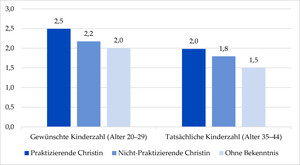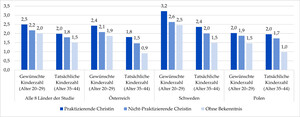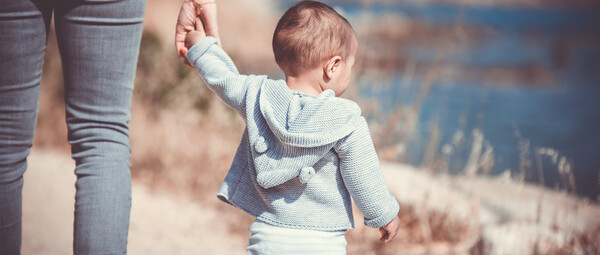Religious people have more children

First one, then two, then three children – or rather no children at all? Why women and men decide for or against children also depends on how religious they are. Whether in Austria, Sweden, Russia, or Poland: people with a Christian denomination who go to church regularly have significantly more children. This is the result of an extensive study that has now been published in the journal "Population, Space and Place".
The researchers Isabella Buber-Ennser from the Vienna Institute of Demography of the Austrian Academy of Sciences (OeAW) and Caroline Berghammer from the University of Vienna analyzed panel surveys from the Generations and Gender Survey between 2002 and 2016 with respect to religiosity, the desire to have children, and the actual number of children. Data from around 34,000 people between the ages of 18 and 45 from eight European countries – Austria, France, the Netherlands, Sweden, Poland, Russia, Bulgaria, and Georgia – were evaluated in this longitudinal study.
The scientists explain that only data from people of Christian faith or those with no religious denomination were examined because of the data availability and the significantly lower proportion of Muslims in the countries examined.
Austria: Christians have twice as many children as those with no religious denomination
Religion still plays a central role in family planning today, as the results suggest. "Our study confirms that practicing Christians, i.e., those who regularly attend church services, want and actually have more children than nominal Christians and non-religious people," says OeAW demographer Isabella Buber-Ennser.
An example of this: in Austria, practicing Christians between the ages of 20 and 29 stated that they would like two to three children. The 35- to 44-year-old practicing Christian women then had an average of two children (1.8). In comparison, for women without a religion, the desired number of children in the age group 20 to 29 was two children (1.9) and the age group 35 to 44 then only had one child (0.9).
Although the data differ from country to country, the general trend is similar: in the eight countries examined, practicing Christian women in the 20 to 29 age group want an average of 2.5 children, and the 35- to 44-year-olds have an average of two. On the other hand, those who do not have a denomination only want two children and have an average of 1.5 children.
Religious teaching and social networks
But how can this be explained? "One explanation is the pronatalist religious teaching. Family and children have high priority. In addition, the gender roles are more traditional. The social network effect also plays a role: churchgoers move in circles with many children and influence each other," says sociologist Caroline Berghammer, who conducts research at the OeAW and the University of Vienna. This is a finding that can be observed across the different countries. But: "The effects are much stronger in Western Europe than in Eastern Europe."
In fact, the data show that in Eastern European countries the desire to have children is realized less often than in the West. The reason for this is not religion but rather the economy. Isabella Buber-Ennser: "The fact that people in Eastern Europe have fewer children than they initially wish has less to do with religiosity than with societal conditions such as economic insecurity."
Publication:
"Religiosity and the realisation of fertility intentions: A comparative study of eight European countries", Isabella Buber-Ennser, Caroline Berghammer, Population, Space and Place, 2021
DOI: https://doi.org/10.1002/psp.2433


